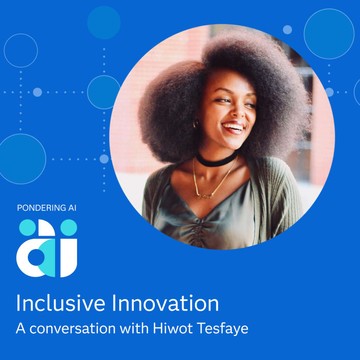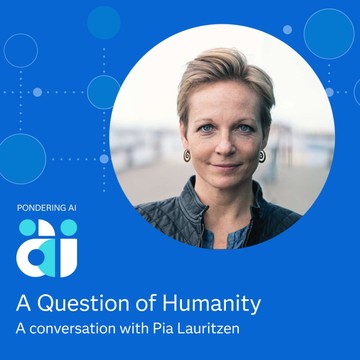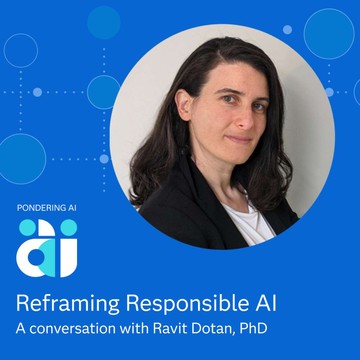

Pondering AI
Kimberly Nevala, Strategic Advisor - SAS
How is the use of artificial intelligence (AI) shaping our human experience?
Kimberly Nevala ponders the reality of AI with a diverse group of innovators, advocates and data scientists. Ethics and uncertainty. Automation and art. Work, politics and culture. In real life and online. Contemplate AI’s impact, for better and worse.
All presentations represent the opinions of the presenter and do not represent the position or the opinion of SAS.
Kimberly Nevala ponders the reality of AI with a diverse group of innovators, advocates and data scientists. Ethics and uncertainty. Automation and art. Work, politics and culture. In real life and online. Contemplate AI’s impact, for better and worse.
All presentations represent the opinions of the presenter and do not represent the position or the opinion of SAS.
Episodes
Mentioned books

Aug 20, 2025 • 47min
Generating Safety Not Abuse with Dr. Rebecca Portnoff
Dr. Rebecca Portnoff generates awareness of the threat landscape, enablers, challenges and solutions to the complex but addressable issue of online child sexual abuse. Rebecca and Kimberly discuss trends in online child sexual abuse; pillars of impact and harm; how GenAI expands the threat landscape; personalized targeting and bespoke abuse; Thorn’s Safety by Design Initiative; scalable prevention strategies; technical and legal barriers; standards, consensus and commitment; building better from the beginning; accountability as an innovative goal; and not confusing complex with unsolvable. Dr. Rebecca Portnoff is the Vice President of Data Science at Thorn, a non-profit dedicated to protecting children from sexual abuse. Read Thorn’s seminal Safety by Design paper, bookmark the Research Center to stay updated and support Thorn’s critical work by donating here. Related Resources Thorn’s Safety by Design Initiative (News): https://www.thorn.org/blog/generative-ai-principles/ Safety by Design Progress Reports: https://www.thorn.org/blog/thorns-safety-by-design-for-generative-ai-progress-reports/ Thorn + SIO AIG-CSAM Research (Report): https://cyber.fsi.stanford.edu/io/news/ml-csam-report A transcript of this episode is here.

Aug 6, 2025 • 51min
Inclusive Innovation with Hiwot Tesfaye
Hiwot Tesfaye disputes the notion of AI givers and takers, challenges innovation as an import, highlights untapped global potential, and charts a more inclusive course. Hiwot and Kimberly discuss the two camps myth of inclusivity; finding innovation everywhere; meaningful AI adoption and diffusion; limitations of imported AI; digital colonialism; low-resource languages and illiterate LLMs; an Icelandic success story; situating AI in time and place; employment over automation; capacity and skill building; skeptical delight and making the case for multi-lingual, multi-cultural AI. Hiwot Tesfaye is a Technical Advisor in Microsoft’s Office of Responsible AI and a Loomis Council Member at the Stimson Center where she helped launch the Global Perspectives: Responsible AI Fellowship. Related Resources#35 Navigating AI: Ethical Challenges and Opportunities a conversation with Hiwot TesfayeA transcript of this episode is here.

Jul 23, 2025 • 52min
The Shape of Synthetic Data with Dietmar Offenhuber
Dietmar Offenhuber reflects on synthetic data’s break from reality, relates meaning to material use, and embraces data as a speculative and often non-digital artifact. Dietmar and Kimberly discuss data as a representation of reality; divorcing content from meaning; data settings vs. data sets; synthetic data quality and ground truth; data as a speculative artifact; the value in noise; data materiality and accountability; rethinking data literacy; Instagram data realities; non-digital computing and going beyond statistical analysis. Dietmar Offenhuber is a Professor and Department Chair of Art+Design at Northeastern University. Dietmar researches the material, sensory and social implications of environmental information and evidence construction. Related Resources Shapes and Frictions of Synthetic Data (paper): https://journals.sagepub.com/doi/10.1177/20539517241249390 Autographic Design: The Matter of Data in a Self-Inscribing World (book): https://autographic.design/ Reservoirs of Venice (project): https://res-venice.github.io/ Website: https://offenhuber.net/ A transcript of this episode is here.

Jul 9, 2025 • 56min
A Question of Humanity with Pia Lauritzen, PhD
Pia Lauritzen questions our use of questions, the nature of humanity, the premise of AGI, the essence of tech, if humans can be optimized and why thinking is required. Pia and Kimberly discuss the function of questions, curiosity as a basic human feature, AI as an answer machine, why humans think, the contradiction at the heart of AGI, grappling with the three big Es, the fallacy of human optimization, respecting humanity, Heidegger’s eerily precise predictions, the skill of critical thinking, and why it’s not really about the questions at all. Pia Lauritzen, PhD is a philosopher, author and tech inventor asking big questions about tech and transformation. As the CEO and Founder of Qvest and a Thinkers50 Radar Member Pia is on a mission to democratize the power of questions. Related ResourcesQuestions (Book): https://www.press.jhu.edu/books/title/23069/questions TEDx Talk: https://www.ted.com/talks/pia_lauritzen_what_you_don_t_know_about_questions Question Jam: www.questionjam.comForbes Column: forbes.com/sites/pialauritzen LinkedIn Learning: www.Linkedin.com/learning/pialauritzen Personal Website: pialauritzen.dk A transcript of this episode is here.

Jun 25, 2025 • 60min
A Healthier AI Narrative with Michael Strange
Michael Strange has a healthy appreciation for complexity, diagnoses hype as antithetical to innovation and prescribes an interdisciplinary approach to making AI well. Michael and Kimberly discuss whether AI is good for healthcare; healthcare as a global system; radical shifts precipitated by the pandemic; why hype stifles nuance and innovation; how science works; the complexity of the human condition; human well-being vs. health; the limits of quantification; who is missing in healthcare and health data; the political-economy and material impacts of AI as infrastructure; the doctor in the loophole; the humility required to design healthy AI tools and create a resilient, holistic healthcare system. Michael Strange is an Associate Professor in the Dept of Global Political Affairs at Malmö University focusing on core questions of political agency and democratic engagement. In this context he works on Artificial Intelligence, health, trade, and migration. Michael directed the Precision Health & Everyday Democracy (PHED) Commission and serves on the board of two research centres: Citizen Health and the ICF (Imagining and Co-creating Futures). Related Resources If AI is to Heal Our Healthcare Systems, We Need to Redesign How AI Is Developed (article): https://www.techpolicy.press/if-ai-is-to-heal-our-healthcare-systems-we-need-to-redesign-how-ai-itself-is-developed/ Beyond ‘Our product is trusted!’ – A processual approach to trust in AI healthcare (paper) https://mau.diva-portal.org/smash/record.jsf?pid=diva2%3A1914539 Michael Strange (website): https://mau.se/en/persons/michael.strange/ A transcript of this episode is here.

Jun 11, 2025 • 47min
LLMs Are Useful Liars with Andriy Burkov
Andriy Burkov talks down dishonest hype and sets realistic expectations for when LLMs, if properly and critically applied, are useful. Although maybe not as AI agents. Andriy and Kimberly discuss how he uses LLMs as an author; LLMs as unapologetic liars; how opaque training data impacts usability; not knowing if LLMs will save time or waste it; error-prone domains; when language fluency is useless; how expertise maximizes benefit; when some idea is better than no idea; limits of RAG; how LLMs go off the rails; why prompt engineering is not enough; using LLMs for rapid prototyping; and whether language models make good AI agents (in the strictest sense of the word). Andriy Burkov holds a PhD in Artificial Intelligence and is the author of The Hundred Page Machine Learning and Language Models books. His Artificial Intelligence Newsletter reaches 870,000+ subscribers. Andriy was previously the Machine Learning Lead at Talent Neuron and the Director of Data Science (ML) at Gartner. He has never been a Ukrainian footballer. Related Resources The Hundred Page Language Models Book: https://thelmbook.com/ The Hundred Page Machine Learning Book: https://themlbook.com/ True Positive Weekly (newsletter): https://aiweekly.substack.com/ A transcript of this episode is here.

May 28, 2025 • 60min
Reframing Responsible AI with Ravit Dotan
In this engaging conversation with Ravit Dotan, an AI ethics researcher and founder of TechBetter, the importance of embedding responsibility into AI innovation is front and center. Ravit argues that all algorithms carry inherent values and that clarity of purpose is essential for beneficial AI use. He critiques the pitfalls of ethics washing and highlights the gap between ethical intentions and actual practices within organizations. The discussion also emphasizes the role of individual advocacy and the need for a collaborative approach to responsibly harness AI.

May 14, 2025 • 48min
Stories We Tech with Dr. Ash Watson
Dr. Ash Watson studies how stories ranging from classic Sci-Fi to modern tales invoking moral imperatives, dystopian futures and economic logic shape our views of AI. Ash and Kimberly discuss the influence of old Sci-Fi on modern tech; why we can’t escape the stories we’re told; how technology shapes society; acting in ways a machine will understand; why the language we use matters; value transference from humans to AI systems; the promise of AI’s promise; grounding AI discourse in material realities; moral imperatives and capitalizing on crises; economic investment as social logic; AI’s claims to innovation; who innovation is really for; and positive developments in co-design and participatory research. Dr. Ash Watson is a Scientia Fellow and Senior Lecturer at the Centre for Social Research in Health at UNSW Sydney. She is also an Affiliate of the Australian Research Council (ARC) Centre of Excellence for Automated Decision-Making and Society (CADMS). Related Resources:Ash Watson (Website): https://awtsn.com/The promise of artificial intelligence in health: Portrayals of emerging healthcare technologies (Article): https://doi.org/10.1111/1467-9566.13840An imperative to innovate? Crisis in the sociotechnical imaginary (Article): https://doi.org/10.1016/j.tele.2024.102229A transcript of this episode is here.

Apr 16, 2025 • 54min
Regulating Addictive AI with Robert Mahari
Robert Mahari examines the consequences of addictive intelligence, adaptive responses to regulating AI companions, and the benefits of interdisciplinary collaboration. Robert and Kimberly discuss the attributes of addictive products; the allure of AI companions; AI as a prescription for loneliness; not assuming only the lonely are susceptible; regulatory constraints and gaps; individual rights and societal harms; adaptive guardrails and regulation by design; agentic self-awareness; why uncertainty doesn’t negate accountability; AI’s negative impact on the data commons; economic disincentives; interdisciplinary collaboration and future research. Robert Mahari is a JD-PhD researcher at MIT Media Lab and the Harvard Law School where he studies the intersection of technology, law and business. In addition to computational law, Robert has a keen interest in AI regulation and embedding regulatory objectives and guardrails into AI designs. A transcript of this episode is here. Additional Resources:The Allure of Addictive Intelligence (article): https://www.technologyreview.com/2024/08/05/1095600/we-need-to-prepare-for-addictive-intelligence/Robert Mahari (website): https://robertmahari.com/

Apr 2, 2025 • 43min
AI Literacy for All with Phaedra Boinodiris
Phaedra Boinodiris minds the gap between AI access and literacy by integrating educational siloes, practicing human-centric design, and cultivating critical consumers. Phaedra and Kimberly discuss the dangerous confluence of broad AI accessibility with lagging AI literacy and accountability; coding as a bit player in AI design; data as an artifact of human experience; the need for holistic literacy; creating critical consumers; bringing everyone to the AI table; unlearning our siloed approach to education; multidisciplinary training; human-centricity in practice; why good intent isn’t enough; and the hard work required to develop good AI. Phaedra Boinodiris is IBM’s Global Consulting Leader for Trustworthy AI and co-author of the book AI for the Rest of Us. As an RSA Fellow, co-founder of the Future World Alliance, and academic advisor, Phaedra is shaping a future in which AI is accessible and good for all. A transcript of this episode is here. Additional Resources: Phaedra’s Website - https://phaedra.ai/ The Future World Alliance - https://futureworldalliance.org/


